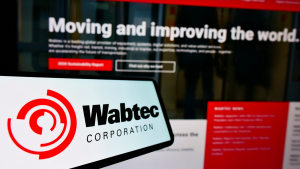As the market continues its ebb and flow, investors are becoming increasingly discerning, shifting their focus from high-flying stocks to value-driven opportunities. Among the sectors facing scrutiny is the industrial realm, where several stocks have inflated to unsustainable levels. In particular, three industrial stocks stand out as prime candidates for divestment by the end of this month.
Riding the Rails: Wabtec Corp. (WAB)

Source: T. Schneider / Shutterstock
Known for its ingenious rail solutions, Wabtec Corp. (NYSE:WAB), formerly Westinghouse Air Brake Technologies Corporation, has surged in recent times, riding the wave of rail transport efficiency. Wabtec’s prowess in safety systems such as Positive Train Control has cemented its position as an industry leader. Over the past decade, the company has enjoyed solid growth in both sales and earnings per share (EPS), with respective compound annual growth rates (CAGR) of 17.3% and 8.2%.
However, despite its bright prospects in an evolving transportation landscape, the stock’s meteoric rise of 49% in the past year raises concerns. Trading at a forward price-to-earnings ratio (P/E) of 22.7, Wabtec’s valuation appears lofty, particularly considering its susceptibility to market cyclicality and interest rate fluctuations. Given this precarious balance, it may be prudent for investors to secure profits and contemplate parting ways with Wabtec at its current valuation.
Unearthing Value: Exponent (EXPO)

Source: Gorodenkoff/ShutterStock.com
Specializing in scientific and engineering consulting, Exponent (NASDAQ:EXPO) excels in providing analytical solutions across a spectrum of industries. The company’s domain expertise has been instrumental in pivotal events such as the investigation of the 2010 Deepwater Horizon oil spill, showcasing its problem-solving prowess.
Despite maintaining a steady compound annual growth rate of 7% in both revenues and EPS over the last decade, Exponent’s stock now finds itself at an overvalued juncture. With a forward price-to-sales ratio (P/S) of 10.5 and a forward P/E of 54.7, the current valuation appears difficult to rationalize given the anticipated growth trajectory. While the company’s track record is admirable, the current valuation provides scant room for safety in an investment context.
Testing the Limits: Heico Corporation (HEI)
Assessing the Soaring Flight of Heico Corporation
Unveiling the Industrial Dynamo
Heico Corporation (NYSE:HEI), renowned for its contributions to the aerospace and defense industry, stands as a beacon of innovation in manufacturing and repairing aircraft components. As a reliable supplier of vital parts to industry giants like Boeing and Airbus, Heico has solidified its reputation as a powerhouse in the sector.
A Journey of Steadfast Growth
Heico’s trajectory has been marked by unwavering growth, propelled by its strategic focus on specialized markets and a commitment to delivering top-notch, cost-effective solutions. The company’s success story is further accentuated by the geopolitical climate, with global tensions amplifying defense expenditures. Notably, Heico has maintained a commendable compound annual growth rate (CAGR) of 10.8% in revenues and 8.9% in earnings per share (EPS) over the last five years.
Reaching the Heights
However, while Heico undoubtedly shines as a top-tier operator in its field, concerns emerge when assessing its current stock performance. With a substantial 27% year-to-date (YTD) surge, the company’s shares appear to have ventured into the realm of overvaluation. Presently trading at over 51 times its forward EPS, Heico’s stock seems steeply priced, even under bullish growth scenarios. The recent bullish wave might offer astute investors a timely chance to reconsider their holdings.
